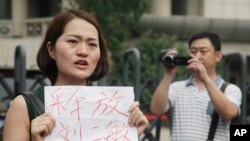President-elect Donald Trump did not pull any punches when it came to criticizing China’s trade practices on the campaign trail, and he pledged to direct his treasury secretary to label Beijing a "currency manipulator" on his first day in office in January.
But much less is known about how he might seek to address worsening human rights conditions in the world’s second-largest economy.
That has dissidents, rights activists and regional political analysts wondering whether traditional American support for rights could soften at a time when they say the Chinese public needs an advocate more than ever.
As a candidate, Trump sidestepped criticizing other countries over human rights, and his campaign rhetoric included disparaging comments about Muslims and immigrants.
In July, after Turkish officials jailed tens of thousands of people following a failed coup attempt, Trump was asked whether he would press authorities there to uphold the rights of citizens.
"I think right now when it comes to civil liberties, our country has a lot of problems, and I think it’s very hard for us to get involved in other countries when we don’t know what we are doing and we can’t see straight in our own country," he said.
At the time, demonstrators had gathered in several U.S. cities to protest police shootings of black men. Trump said the United States should focus on addressing its own problems instead of speaking about rights issues abroad.
"When the world looks at how bad the United States is, and then we go and talk about civil liberties, I don't think we're a very good messenger," he told The New York Times.
Activists worry
For Chinese rights activists, the signs from the incoming U.S. president are troubling.
"It seems that these attitudes probably [could] spill over to a generally hostile attitude toward human rights in other countries as well," says Maya Wang, a China researcher in Hong Kong with the international advocacy group Human Rights Watch. "It is worrying, given that the U.S. government has been largely a consistent supporter of pressing human rights in China and we fear we might lose an important ally."
Since Chinese leader Xi Jinping began his rise to power in 2012, he has worked to expand his authority and tighten control over society and all forms of expression. In addition to recently passing a restrictive law over foreign nongovernment organizations, which goes into effect in January, he has jailed dissidents and activists and cracked down on rights lawyers.
Pragmatic approach
Hu Jia, a prominent activist, knows well the lengths to which Chinese authorities will go to suppress opposing views. He was sentenced to jail for more than three years in 2008 and released before Xi came to power.
Like many others who speak out, Hu Jia continues to face scrutiny by security officers who are posted outside his home. He is not allowed to travel overseas, and his wife and daughter live in Hong Kong.
Hu Jia told VOA that, for many in China, Trump is an unknown quantity.
"His remarks about foreign policy, religion and rights on the campaign trail and all the other comments he’s made don’t instill us with confidence," Hu Jia said.
Some Chinese dissidents at home and overseas think the checks and balances of the U.S. political system will help ensure that the new president is more pragmatic about human rights issues.
Ge Yongxi, a rights lawyer in southern Guangzhou province, said he believes that the "reasonable” Trump presented to American voters late in his campaign and in his victory speech shows he’s making that shift back.
"Although there are many people who are saying there is a lot of uncertainty about Trump’s policies, I don’t believe that there will be a paradoxical shift away from fundamental American values," Ge says.
Grand bargain
But as China’s economic power and influence grows, it becomes increasingly difficult to find ways to pressure, influence or even persuade the country. Activists say they will be watching closely to see who Trump appoints to key positions and whether the next administration continues to openly press China on individual cases.
Initial clues about how a Trump administration might approach China and the rights issue appear in an opinion piece published in the South China Morning Post on Thursday. It was written by James Woolsey, a former Central Intelligence Agency director who’s the senior adviser to the president-elect on national security, defense and intelligence.
In the piece, Woolsey argues that while the U.S. has an unwavering commitment to advancing freedom, it also needs to recognize and perhaps accept some ideological differences with China.
“As we improve our understanding of the complexities of the Chinese social and political system, it becomes increasingly apparent that challenging the current system is a risky endeavor,” Woolsey wrote. “We may not like it but we don’t necessarily have to do something about it.”
Woolsey writes that such a grand bargain may not be a spoken agreement, but a tacit understanding “in which the U.S. accepts China’s political and social structure and commits not to disrupt it in any way in exchange for China’s commitment not to challenge the status quo in Asia.”
VOA’s Joyce Huang contributed to this report.




